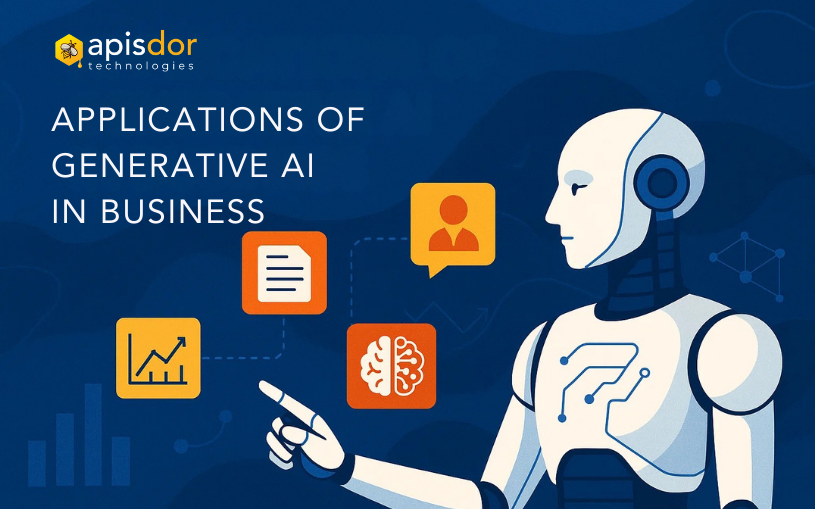Exploring Generative AI Applications in Enterprises

In recent times, generative AI has changed the game across many industries, moving far beyond the old-school chatbots we used to know. This technology is like a breath of fresh air for businesses, affecting how they operate, innovate, and connect with their customers. From taking over boring tasks to designing experiences that speak to users, the impact of generative AI in business is nothing short of remarkable.
Generative AI involves smart algorithms that can produce content, designs, and even strategic advice, making it a valuable player in enterprise applications. By embracing this technology, companies can discover new efficiencies and creative answers to the unique challenges they face. In this post, we will dive into several key applications of generative AI in enterprises, showcasing its capabilities and benefits.
We’ll look at areas like automated content creation, improved customer interactions, design breakthroughs, data analysis, and more. Join us as we explore how generative AI is setting fresh standards across different sectors and the exciting opportunities it opens up.
Automated Content Creation
One of the most important roles of generative AI in business is its ability to create content automatically. Companies are more reliant than ever on high-quality content to attract customers and convey their brand story. With generative AI on their side, businesses can produce articles, reports, and marketing materials swiftly and effectively.
For instance, AI models like OpenAI’s GPT-3 can generate tailored content for specific audiences at lightning speed. According to a study by
According to a study by Content Marketing Institute, 67% of marketers are using AI to enhance their content strategies.
This feature not only saves valuable time but also enables teams to focus on strategic tasks, such as brainstorming and collaboration.
Moreover, businesses can harness natural language processing (NLP) tools to review existing content and spot gaps, empowering them to craft more effective material that resonates with their audience.
Enhanced Customer Interactions
Generative AI is revolutionizing customer service by facilitating more personalized interactions. Chatbots have become a common fixture in maintaining communication with customers, but generative AI boosts their capabilities to a new level.
Advanced chatbots are equipped to understand context and emotions, allowing them to engage users in a more meaningful way.
A report from McKinsey reveals theat AI-driven customer interactions can boost customer satisfaction by 20%.
With the right data, businesses can train these AI systems to provide recommendations, carry out transactions, and even assist with technical support.
This creates a smooth experience for users and enhances loyalty and trust in the brand. Companies can also gather valuable insights from these interactions, tuning their products and services based on customer feedback.
Design Innovation
In sectors like fashion and consumer goods, generative AI is reshaping the design journey. AI algorithms can analyze market trends, customer preferences, and past data to create new design ideas. This not only accelerates the creative process but also ensures that designs are in sync with what customers want.
For example,
Researchgate emphasizes that AI tools can generate thousands of design variations in a fraction of the time it would take a human designer.
This helps businesses roll out products more swiftly and remain one step ahead of competitors.
Additionally, generative design helps engineers and product teams visualize intricate structures and enhance functionality, merging creativity with engineering precision.
Data Analysis and Insights
Data is the heartbeat of any business, and generative AI can significantly improve data analysis capabilities. Unlike traditional business intelligence tools, which need a lot of human effort to sift through large volumes of data to draw insights, generative AI can automate this process.
Generative AI can spot data patterns and create reports filled with actionable insights.
According to Gartner, organizations using AI-powered data analysis have reported efficiency improvements of up to 30%.
This boost in efficiency translates to more informed decision-making and strategic planning.
AI-driven data visualization tools can create user-friendly dashboards that simplify complex information, allowing teams to focus on thoughtful strategy instead of monotonous data entry.
Fraud Detection
In industries like finance and insurance, preventing fraud is crucial. Generative AI amplifies fraud detection systems by recognizing unusual patterns in transactions and highlighting potentially fraudulent activity.
By learning from past data, AI systems can enhance their detection abilities over time, drastically cutting down on false positives. A report by
A report by PwC shows that companies using AI for fraud detection can see detection rates jump by 80% or more.
Integrating these AI systems enables organizations to react quickly to threats, potentially saving millions in losses and preserving customer trust.
Conclusion
Ultimately, generative AI is establishing itself as a transformative player in the enterprise world. From streamlining content creation to improving customer interactions and beyond, the practical applications of this technology are hard to ignore.
Businesses that adopt generative AI technologies are positioning themselves for future success, aligning their strategies with the changing demands of the market and their customers. As this technology continues to mature, its impact will only become more significant, shaping industries and workflows that fuel future innovations.
Frequently Asked Questions
Q1: What is generative AI?
A: Generative AI refers to algorithms that can create content, designs, and strategies by learning from existing data. It automates processes and enhances creativity across various applications.
Q2: How can generative AI improve customer service?
A: It enhances customer service by enabling chatbots to understand context and sentiment, offering personalized interactions and quicker responses to inquiries.
Q3: What industries are benefiting from generative AI?
A: Industries like finance, design, marketing, and healthcare are leveraging generative AI to maximize efficiency, improve customer interactions, and innovate products.
Q4: How does generative AI aid in data analysis?
A: Generative AI can automate data analysis by identifying patterns and generating reports, leading to more informed business decisions with less manual effort.
Q5: Is generative AI only for large enterprises?
A: No, generative AI can benefit businesses of all sizes. Small and medium enterprises can leverage it to enhance their operations and compete effectively.
